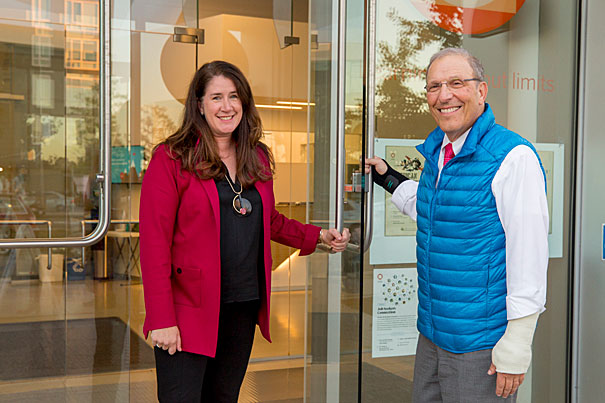
HBS teachers Kristen Mugford (left) and Len Schlesinger gave a joint Ed portal talk aimed at helping small business owners develop strategies to compete in a changed marketplace.
Rose Lincoln/Harvard Staff Photographer
How the mom-and-pop can compete in a changed marketplace
Ed Portal talk gives small business owners tips to keep customers buying local
With the companies such as Amazon, Airbnb, and Uber transforming the economic landscape, businesses, especially small neighborhood businesses, are having to rethink the traditional model. Balancing goods, services, and profit is becoming increasingly difficult.
What does that mean for our communities, customer service, and even jobs?
Harvard Business School’s (HBS) Baker Foundation Professor Leonard Schlesinger and senior lecturer of business administration Kristin Williams Mugford are trying to answer those questions, utilizing 30 years of industry data to help keep local businesses in the neighborhood.
“The citizen question is, what do we want our neighborhood to be like and feel like?” Schlesinger said. “There are benefits to large-scale companies because they can use technology to manage customer relationships that small businesses struggle [to do]. But there are bigger, broader public policy questions. Small businesses are the engines of growth for job creation and they’re at the very root of what makes our communities different and unique.”
These critical issues were discussed during the Faculty Speaker Series lecture “What Great Service Leaders Know and Do” at the Harvard Ed Portal in Allston on Oct. 18. Nearly 40 small business owners, students, and members of the Allston-Brighton community came to learn what customer service means today.
Schlesinger opened the discussion by laying out three decades of research on service and service firms, and the approach he said amounts to “common sense”: delivering a high-quality and memorable customer experience, as well as value, whether the business is a car dealership, department store, or pizza-delivery service.
“We have encounters we call moments of truth, we understand the underlying psychology of those interactions, and our job as service leaders is to manufacture sets of interactions that are ideally memorable in a positive way,” he said.
Positive interaction traditionally has been related to employee satisfaction, he said — happy employees deliver better customer service; employees who feel valued give value. But companies such as Amazon deliver value in a way that a mom-and-pop business can’t. Not only are their goods and services usually cheaper, but they’re more convenient, ordered online and delivered to the customer’s front door.
Access, convenience, and availability aren’t the only things changing the relationship between businesses and consumers. Large companies can rely on automation. Contracted labor arrangements, such as Uber and Airbnb, further complicate the equation. Building service businesses without owning anything is quickly becoming the norm.
“These are profound changes and they have significant implications not only for our research, but for our lives and how we think about what’s going on,” Schlesinger said.
How does this new economic reality play out in our neighborhoods and social interactions? What is its impact on work quality, and the quality of jobs in the United States?
Mugford explores these questions in her class “Neighborhood Business Partnership,” a field course in which students work directly with local business owners facing some of these challenges.
Mugford explained that large companies have some enormous advantages that make it very difficult for local businesses to compete, despite the community benefits of neighborhood businesses and face-to-face interactions.
“One-third of private sector jobs are in small businesses,” she said. “But it’s really hard to be a small-businessperson.”
For example, some of her students worked in a neighborhood bookstore in Roxbury that is trying to figure out how to keep its customers when they can buy any book they want online, usually at a lesser cost. But the bookstore is considered an anchor in the community and plays an important role in neighborhood stabilization, Mugford said.
“We’re working on addressing these businesses one a time, highlighting the dilemmas and tensions and some of the things that have to happen at the local level,” she said. “But that comes with understanding the dilemmas associated with access to capital, because competing with these bigger firms requires access to that.”
Even financial institutions such as small banks and credit unions must learn how to effectively leverage the local market in the growing online global-banking economy.
“I am the branch manager at a local bank just down the street and feel the conversation about effective customer service is very important,” said Alicia Yeh, assistant vice president and branch manager of Rockland Trust in Allston. “It’s imperative not just to local business providers, but to the people in the neighborhood who utilize the businesses in their community.”
So, what do small businesses need to compete? Mugford said the keys are education and support for owners, smart regulation that promotes growth, and loyal, local customers.
“This talk allows us to share something significant for the community. It’s a beautiful alignment with the economic development of the neighborhood,” Robert Lue, faculty director of the Harvard Ed Portal, said in his opening remarks. “It’s a perfect example of that kind of true integration and co-creation that we feel is absolutely critical for the future of our neighborhood businesses.”




